In a move that feels almost like a political intrusion into the realm of public health, the recent reshuffling of the Advisory Committee on Immunization Practices (ACIP) has sent ripples of concern throughout the medical community. Appointed by Health and Human Services Secretary Robert F. Kennedy Jr., the new members include several individuals known for their skepticism of vaccines. This is troubling in an era where misinformation poses a significant threat to public health.
The integrity of vaccine policy is at stake, and the implications of these appointments are far-reaching. A trusted body such as the ACIP, responsible for evaluating vaccine data and making recommendations that affect millions, should ideally consist of unbiased experts who operate solely based on scientific evidence. However, with members like Dr. Robert Malone, who has made a name for himself disseminating misleading claims about COVID-19 vaccines, the objectivity of the committee comes into question. This troubling development raises essential issues about the balance between free speech and responsible governance in health policy.
Understanding the Experts’ Dilemma
Dr. Martin Kulldorff, the newly appointed chair of the ACIP, claims that vaccines are neither wholly good nor entirely bad. This sort of vague assertion implies a conciliatory tone, suggesting that there is a middle ground between the extremes of vaccine acceptance and rejection. While nuance is vital in public discourse, it also risks diluting the scientifically backed consensus that vaccines are an essential tool in combatting infectious diseases.
Kulldorff’s framing might unintentionally embolden the anti-vaccine movement by suggesting there is significant merit in their arguments—an assertion that, on the surface, sounds remarkably empathetic but runs the risk of enabling harmful ideologies. We live in a world grappling with the consequences of vaccine hesitancy, and statements that lend credibility to unfounded fears can have dire repercussions.
Moreover, the skepticism surrounding the ACIP is compounded by the presence of members like Retsef Levi, who have advocated for the abolition of mRNA vaccines based on dubious claims regarding their safety. When the stakes are so high—public trust in vaccination and the health of vulnerable populations—the choice of committee members should reflect an adherence to credible science, not a platform for controversial voices.
Fostering Misinformation in the Ranks
Compounding the issue is the potential conflict of interest within the committee. Vicky Pebsworth, another newly appointed member, has affiliations with organizations like The National Vaccine Information Center, notorious for propagating vaccine misinformation. Pebsworth’s disclosure of her stock holdings in healthcare funds, including vaccine manufacturers, raises eyebrows regarding her impartiality. Even if her financial interests fall below official conflict-of-interest thresholds, the mere perception of bias can erode public trust in the body tasked with determining vaccine guidelines.
The implications of these new appointments resonate beyond the immediate concerns of vaccine policy; they symbolize a broader cultural conflict about the nature of expertise and the sources of authority in public health. As scientific consensus faces off against vocal dissenters, the importance of maintaining an evidence-based framework for public health governance has never been more crucial.
The Role of Evidence in Policy-Making
The new ACIP’s first meeting serves as a pivotal moment not just for the committee but for the future of public health initiatives in the United States. As the panel evaluates upcoming recommendations concerning COVID-19 vaccines and others, the potential for a significant pivot in vaccine policy looms large. This moment may define how the U.S. approaches vaccination in a post-pandemic world, where the trust in vaccines is already beleaguered.
In the face of mounting skepticism and misinformation, it is essential for the ACIP to stand as a bastion of science and integrity. Reestablishing confidence in immunizations depends not only on delivering well-researched recommendations but also ensuring that the experts entrusted with making those recommendations are beyond reproach. This is the real challenge: navigating the treacherous waters of public opinion while ensuring that sound science remains at the forefront of health policy.
In this complex arena, where public health and political agendas intertwine, the emergence of an ACIP that represents a myriad of skeptical voices raises worrying questions. Will the voices of evidential skepticism drown out the hymns of scientifically backed consensus? Or can the ACIP emerge as a credible institution that carefully weighs scientific research against vocal dissent? The implications extend well beyond the realm of vaccines, affecting the foundational trust in the institutions designed to protect public health.

